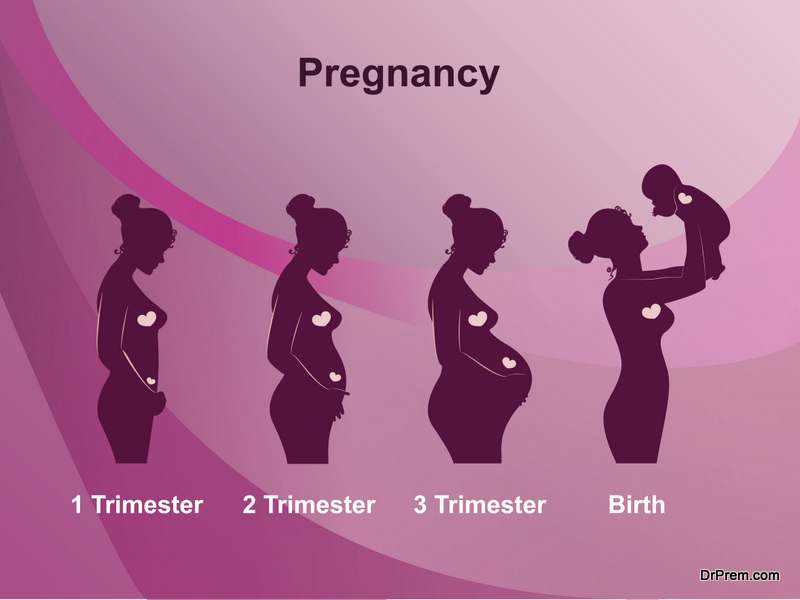Knowing about the physical and emotional changes that happen during pregnancy helps you to become more aware of your body and its needs. It also assists you to remain calm if you understand that these changes are perfectly normal. Following the baby’s development from conception to the last days in the womb, along with necessary alterations in your body can result in a smooth and problem-free journey from pregnancy to motherhood. Each month has at least one additional feature on a relevant aspect of pregnancy. Here is a description of month-by-month calendar summary of the fetal growth in the last trimester of your pregnancy, along with proper antenatal care to be taken during this phase so as to assure a healthy and relaxed delivery for you as well as your little one.
Seventh month
 Now, with only three months of your pregnancy remaining, you will be starting to feel large and clumsy, and perhaps forgetful as well. During the third trimester, the baby lays down fat stores. It is very active and you may feel the baby moving around. There are many physical changes, which you may notice in yourself. You may be troubled by heartburn, indigestion, and cramps.
Now, with only three months of your pregnancy remaining, you will be starting to feel large and clumsy, and perhaps forgetful as well. During the third trimester, the baby lays down fat stores. It is very active and you may feel the baby moving around. There are many physical changes, which you may notice in yourself. You may be troubled by heartburn, indigestion, and cramps.
Red stretch marks may appear on your stomach and the veins on your breasts will probably become more noticeable. The top of the womb will now be about halfway between your navel and breastbone, with weight gain more on your buttocks and thighs as well as your stomach. You may feel Faint Braxton Hicks or false contractions at times. The growing anxiety within you may lead to vivid dreams about your baby’s birth, which is quite normal and is in no way an indication of anything being wrong with the baby.
Between weeks 30 to 33, the baby’s hearing sensation is well developed, eyes become unsealed, and the face and body are covered with vernix, which waterproofs the skin. The baby’s skin may appear red and wrinkled, but fat starts to accumulate beneath it. Dramatic developments take place in the thinking part of the brain, which becomes bigger and more complex. A seven-month-old fetus can feel pain, has an acute sense of taste, and responds in much the same way as a full-term baby. The baby’s lungs, though, are still not fully mature. They still need to develop a substance called surfactant, which stops them from collapsing between each breath. To sum up, your baby will measure about 37 cm in length and weigh about 900 to 1,000 gm by the seventh month of your pregnancy.
Eighth month
 During the eighth month, from week 33 to 36, you need all the rest you can get, so try to lie down in the middle of the day as well. You will feel very bulky and weary of your pregnant state. You can start your parent-craft classes that would continue until the end of your pregnancy tenure. As the baby grows larger, he will start pressing more on your internal organs, which may lead to breathlessness and the desire to urinate more frequently. You might also experience a little urine leakage whenever you run, cough, sneeze or laugh.
During the eighth month, from week 33 to 36, you need all the rest you can get, so try to lie down in the middle of the day as well. You will feel very bulky and weary of your pregnant state. You can start your parent-craft classes that would continue until the end of your pregnancy tenure. As the baby grows larger, he will start pressing more on your internal organs, which may lead to breathlessness and the desire to urinate more frequently. You might also experience a little urine leakage whenever you run, cough, sneeze or laugh.
You may have an incessant and irregular sleeping pattern. Your navel will appear flattened or even popped out. Your pelvic joints will start expanding for the birth of your baby so you may have some discomfort in this area. Moreover, the dark line running down your stomach may have become very prominent and the base of your rib cage may be sore as your womb presses upwards.
Looking at the baby’s development during this stage, the head will be in the same proportion as compared to the body. The baby looks much the same, as it would appear at birth. But the body still needs to fill out more. The lungs are now fully developed. Due to the scarcity of moving space within the womb, the baby will probably have turned into a head-down position by now, ready for birth. Concisely, the baby will now be weighing about 1.6 kg. Its length will be approximately 16 inches by the eighth month of your pregnancy.
Ninth month
 The last four weeks, from week 37 to week 40, is the most challenging time for a mother-to-be. You may be longing for the pregnancy to be over. Yet, you will still feel apprehensive about labor, birth, and becoming a parent. The baby takes up all the space in the womb. So he kicks and punches rather than shifting his whole body during the third trimester. Your heartburn, indigestion, and breathlessness should lessen any time now once the baby’s head drops into the pelvis. And your bladder is under pressure so you may feel the urge to urinate very frequently.
The last four weeks, from week 37 to week 40, is the most challenging time for a mother-to-be. You may be longing for the pregnancy to be over. Yet, you will still feel apprehensive about labor, birth, and becoming a parent. The baby takes up all the space in the womb. So he kicks and punches rather than shifting his whole body during the third trimester. Your heartburn, indigestion, and breathlessness should lessen any time now once the baby’s head drops into the pelvis. And your bladder is under pressure so you may feel the urge to urinate very frequently.
Your growing belly will seem to alter your usual weight distribution. So it is important for you to concentrate on good posture during your third trimester. You will have a feeling of heaviness in your lower abdomen with the cervix softening in preparation for labor. Braxton Hicks contractions may be so noticeable, especially in the last 2 weeks. This means, you may think you are in labor, but they will not be regular. Your skin will feel stretched and the size of your womb will make it difficult for you to sleep. There may be pins and needles in your legs during the third trimester, which may cause uneasiness, especially at night.
The baby in your womb will be more rounded because of the fat being stored in his body. Its skin is pink and has soft nails, which have grown till the tips of the fingers and toes. The nails may be so sharp that the baby may actually scratch himself with them. In a boy, his testicles should have descended. Most of the lanugo hair has disappeared, with a very little left over his shoulders, arms, and legs. He may be covered in vernix. A dark substance called meconium gathers in his intestines. He will pass this with his first bowel movement after birth.
By the end of 40 weeks, your baby will weigh 3.4 kgs approximately. Plus, your baby will be about 20 inches in length. You will be most impatient to give birth. But you will also feel the excitement and relief, that you are nearly there. Rest as much as possible and enjoy the third trimester.
Things to remember
Remember, despite given guidelines about the development of the baby along with changes in your body at every stage of pregnancy, every pregnancy varies from person to person. No two pregnancies develop at the same rate or feel the same. You should not feel alarmed if you have not experienced or noticed certain changes by the above given stipulated time period. The most important thing is to have regular check-ups done under the supervision of a good gynecologist or midwife every month to keep a check on your increasing weight and blood pressure levels. It is equally important to monitor your baby’s heartbeat and movements at every stage. This is to assure a healthy, uncomplicated, and hassle-free pregnancy, labor and childbirth.


